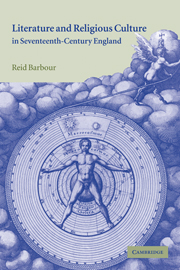Book contents
- Frontmatter
- Contents
- Acknowledgements
- Introduction: spirit and circumstance in Caroline Protestantism
- Chapter 1 The church heroic: Charles, Laud, and Little Gidding
- Chapter 2 Great Tew and the skeptical hero
- Chapter 3 Between liturgy and dreams: the church fanciful
- Chapter 4 Respecting persons
- Chapter 5 Decorum and redemption in the theater of the person
- Chapter 6 Nature (I): post-Baconian mysteries
- Chapter 7 Nature (II): church and cosmos
- Conclusion: Rome, Massachusetts, and the Caroline Protestant imagination
- Notes
- Index
Chapter 3 - Between liturgy and dreams: the church fanciful
Published online by Cambridge University Press: 22 September 2009
- Frontmatter
- Contents
- Acknowledgements
- Introduction: spirit and circumstance in Caroline Protestantism
- Chapter 1 The church heroic: Charles, Laud, and Little Gidding
- Chapter 2 Great Tew and the skeptical hero
- Chapter 3 Between liturgy and dreams: the church fanciful
- Chapter 4 Respecting persons
- Chapter 5 Decorum and redemption in the theater of the person
- Chapter 6 Nature (I): post-Baconian mysteries
- Chapter 7 Nature (II): church and cosmos
- Conclusion: Rome, Massachusetts, and the Caroline Protestant imagination
- Notes
- Index
Summary
The Caroline fascination with the role of fancy in elevating the reverence of worship focuses on a circumstance of faith that shares many points of contact with the pomp and circumstance of epic religion. In both cases, a wide range of writers in the 1620s, 30s, and 40s answer the charge leveled at their church from Catholic quarters that theirs is an impoverished or a gaunt religion, a paltry showing for those talents divinely bestowed on the stewards of the church militant. In such cases, discussions of heroism and fancy mutually turn to the value and peril of ceremony. Accordingly, fancy is often held responsible for the heroic elevation of the faith, and even more often for the bankruptcy and bathos of epic inflation. Like heroism, too, the circumstance of imagination has both inward and outward manifestations.
Yet the skepticism of Tevian heroism notwithstanding, Caroline explorations of the assets and liabilities of imagination in worship are more intricately involved in the epistemology on which worship itself is premised, and thus in the uncontrollable ways in which the experience of faith unsettles the stability of English Protestant identity. Every seventeenth-century writer knew that fancy had a tendency to take flight, but with its strong links to ceremonial worship and to Stoic notions of the material pneuma, the faculty has a way of landing Caroline explorers of religious circumstance in the more mundane realms of the social order and of the body.
- Type
- Chapter
- Information
- Publisher: Cambridge University PressPrint publication year: 2001



